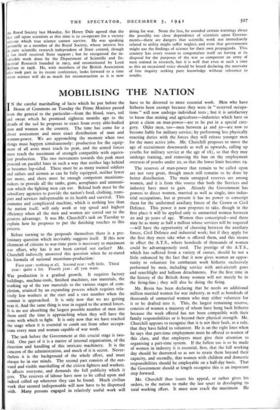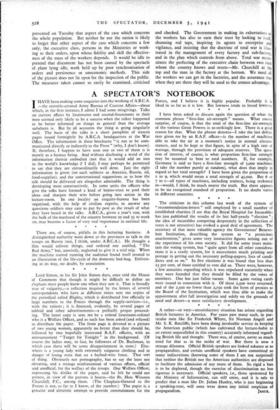MOBILISING THE NATION
r N the careful marshalling of facts which he put before the I House of Commons on Tuesday the Prime Minister passed from the general to the particular—from the blood, tears, toil and sweat which he promised eighteen months ago to the details of the toil he proposes to exact from every able-bodied man and woman in the country. The time has come for a closer assessment and more exact distribution of man and woman-power. We are approaching the moment when two things must happen simultaneously: production for the equip- ment of all arms must reach its peak, and the armed forces must reach the maximum of strength compatible with equiva- lent production. The two movements towards this peak must proceed on parallel lines in such a way that neither lags behind or becomes lop-sided. There must be as many trained soldiers and sailors and airmen as can be fully equipped, neither fewer nor more, and there must be enough competent munitions- makers to provide all the tanks, guns, aeroplanes and ammuni- tion which the fighting men can use. Behind both must be the subsidiary agencies to provide the nation's food, clothing, trans- port and services indispensable to its health and survival. This immense and complicated machine, which is nothing less than the nation itself, will only work at top speed and highest efficiency when all the men and women are sorted out to the greatest advantage. It was Mr. Churchill's task on Tuesday to explain how he proposes to put the finishing touches to this process.
Before turning to the proposals themselves there is a pre- liminary question which inevitably suggests itself. If this new allotment of citizens to war-time posts is necessary to maximum war effort, why has it not been carried out earlier? Mr. Churchill indirectly answered this question when he re-stated his formula of national munitions-production: First year: nothing at all. Second year : very little. Third year: quite a lot. Fourth year: all you want.
War production is a gradual growth. It requires factory buildings, machine-tools, finished machines, raw materials, the working up of the raw materials to the various stages of com- pletion, attained by an expanding process which requires rela- tively few workers at the start and a vast number when the summit is approached. It is only now that we are getting near it. And the same thing is true in regard to the armed forces. It is no use absorbing the largest possible number of men into them until the time is approaching when they will have the arms with which to fight. It is only now that we have reached the stage when it is essential to comb out from other occupa- tions every man and woman capable of war work.
The task before the Government at this crucial stage is two- fold. One part of it is a matter of internal organisation, of the direction and handling of this intricate machinery. It is the concern of the administration, and much of it is secret. Never- theless it is the background of the whole effort, and must always be in our minds. The second part consists of the out- ward and visible marshalling of the citizen fighters and workers. It affects everyone, and demands the full publicity which it gets. The reserves of labour have now to be called upon and indeed called up wherever they can be found. Much civilian work that seemed indispensable will now have to be dispensed with. Many persons engaged in relatively useful work will have to be diverted to more essential work. Men who have hitherto been exempt because they were in "reserved occupa- tions" will now undergo individual tests ; but it is satisfactory to know that mining and agriculture—industries which have so great a claim on man-power—are to be put in a special cate- gory. Older men, too—men between 41 and 50—are now to become liable for military service; by performing less physically exacting duties with the forces they will release younger men for the more active jobs. Mr. Churchill proposes to move the age of recruitment downwards as well as upwards, calling up youths for military service at the age of 181, so that they may undergo training, and removing the ban on the employment overseas of youths under 20, so that the lower limit becomes 19.
The reserves of man-power that remain to be called upon are not very great, though much still remains to be done by better distribution. The main untapped reserves are among women, and it is from this source that both the Services and industry have most to gain. Already the Government has powers to direct women, married as well as single, into indus- trial occupations, but at present it has no power to conscript them for the uniformed auxiliary forces of the Crown or Civil Defence. This power it now proposes to take, though in the first place it will be applied only to unmarried women between 20 and 30 years of age. Women thus conscripted—and there may be as many as half a million whose services will be required —will have the opportunity of choosing between the auxiliary forces, Civil Defence and industrial work; but if they apply for the first they must take what is offered them, and this means in effect the A.T.S., where hundreds of thousands of women could be advantageously used. The prestige of the A.T.S., which has suffered from a variety of causes, should be not a little enhanced by the fact that it now gives women an oppor- tunity to volunteer for combatant work hitherto exclusively performed by men, including service with anti-aircraft guns and searchlight and balloon detachments. For the first time in the history of the British Army women will not merely be in the firing-line ; they will also be doing the firing.
Mr. Bevin has been declaring that he needs an additional million married women for war industry, as well as hundreds of thousands of unmarried women who may either volunteer for it or be drafted into it. This, the largest remaining reserve, consists of women a majority of whom have hung back hitherto because the work offered has not been compatible with their family responsibilities or is beyond their physical strength. Mr. Churchill appears to recognise that it is not their fault, as a rule, that they have failed to volunteer. He is on the right lines when he says that part-time employment must be offered to women of this class, and that employers must give their attention to organising a part-time system. If the fullest use is to be made of women in industry it is essential, first, that the full working day should be shortened so as not to strain them beyond their capacity, and secondly, that women with children and domestic responsibilities should be employable on a half-day basis. That the Government should at length recognise this is an important step forward.
Mr. Churchill thus issues his appeal, or rather gives his orders, to the nation to make the last spurt in developing its total working effort. It must now reach the maximum. He presented on Tuesday that aspect of the case which concerns the whole population. But neither he nor the nation is likely to forget that other aspect of the case which concerns a few only, the executive class, persons in the Ministries or work- ing to their orders, upon whose fidelity and skill the effective- ness of the mass of the workers depends. It would be idle to pretend that discontent has not been caused by the spectacle of plant lying idle, work held up by poor synchronisation of orders and persistence in uneconomic methods. This side of the picture does not lie open for the inspection of the public. The measures taken cannot so easily be examined, criticised and checked. The Government in making its exhortations to the workers has also to earn their trust by looking to itself, shunning red tape, inspiring its agents to enterprise and vigilance, and insisting that the doctrine of total war is illus- trated in the management of every factory and sub-factory, and in the plan which controls from above. Total war neces- sitates the perfecting of the executive chain between two men whom the country knows and trusts—Mr. Churchill at the top and the man in the factory at the bottom. We need all the workers we can get in the factories, and the assurance that when they are there they will be used to the utmost advantage.























 Previous page
Previous page